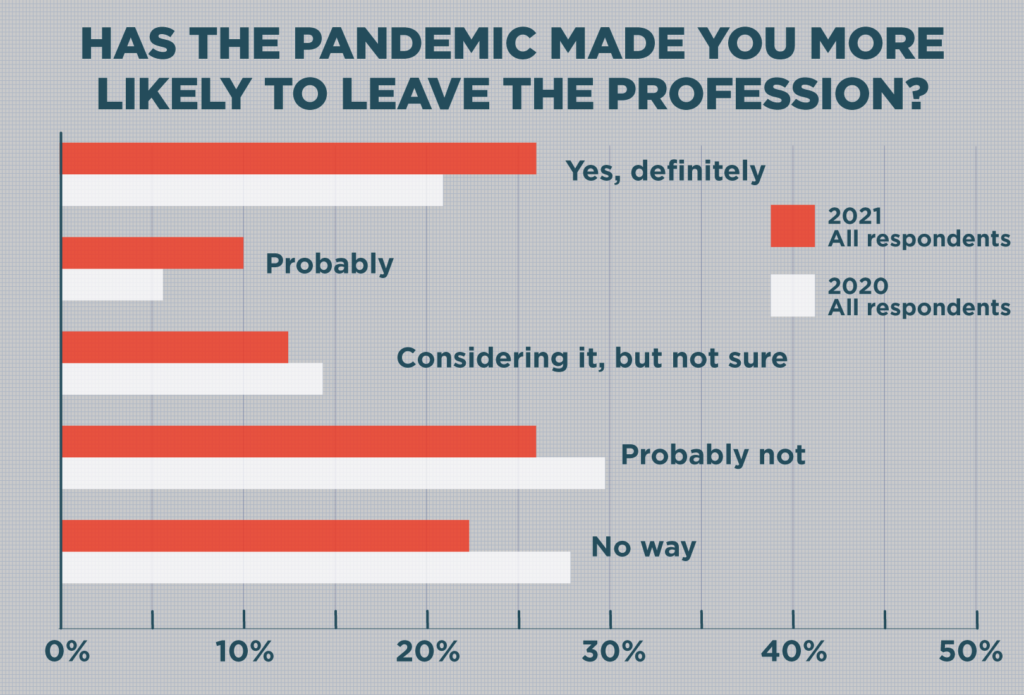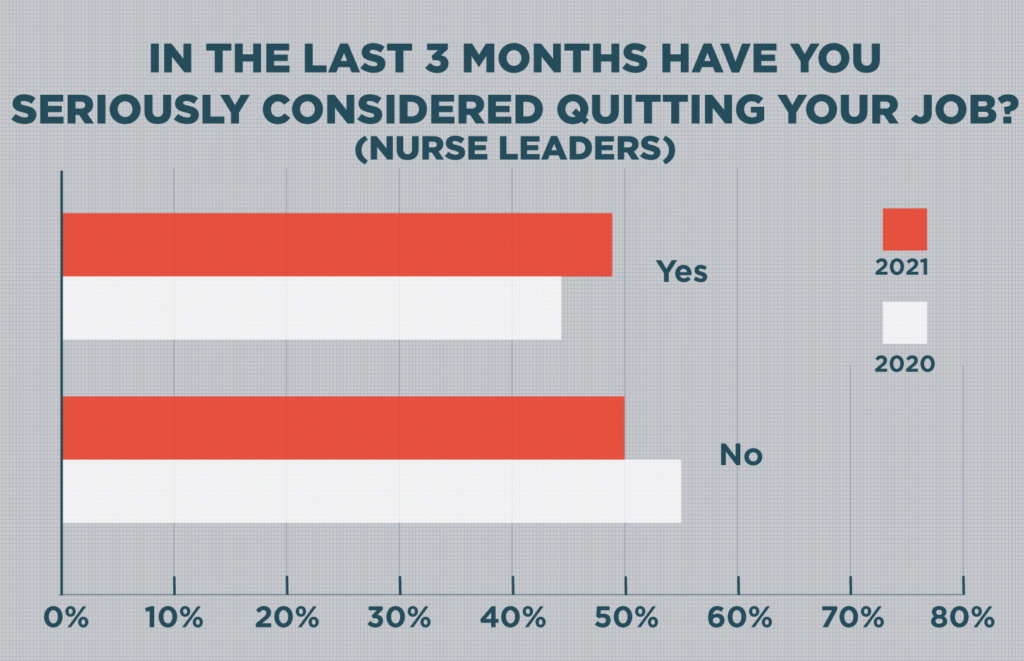
The majority of long-term care nurses may not be at the end of their rope yet, but a significant percentage is sliding in that direction, according to results of a new McKnight’s Long-Term Care News survey of industry leaders.
Findings of the 2021 McKnight’s Mood of the Market survey shed unsettling light on fragile workplaces and severely tested workforces. Nursing homes have been associated with about a quarter of all U.S. COVID-19 deaths and cases.
More than 52% of recently surveyed nursing home nurse leaders said the pandemic has made them consider leaving the profession, according to results of the survey. A year ago, that total was less than 39%.
The “yes, definitely” more likely to leave response option soared to 29.4% from 17% over the past year. Meanwhile, the “no way” more likely to leave option fell to 24% from 33%, suggesting hardening attitudes after nearly a year and a half of grinding work amid devastating coronavirus conditions.

Administrators, who are typically more detached from caregiving front lines, also showed they are less inclined to stay in the profession, though by much more modest margins. Nearly 3% more (48+%) of the 320 administrators responding said they were considering or more likely to leave the profession. The change was about the same percent that deserted the “no way” ranks over the last year (down to 22%).
Similarly, nurse managers were much more likely to say they had “seriously considered quitting” their job over the last three months (57%) than administrators (43%), or their counterparts just a year earlier (46%).
By comparison, a recent Post-Schar School poll revealed that one-third of all U.S. workers under 40 had considered leaving their jobs since the pandemic struck. Various other mainstream polls recently have noted “high” rates of disgruntled employees intent on leaving their professions, but at rates still about half the rate of nursing home workers.
The third annual McKnight’s Mood of the Market gathered the attitudes of 627 long-term care administrators and nurse managers, a 65% rise in participants over last year. They answered 15-question surveys between July 28 and Aug. 3, 2021. A random drawing for five $100 gift cards was offered as incentive to participate.
Top long-term care managers overwhelmingly continue to feel their work is meaningful. But after nearly a year and a half of historically dangerous pandemic conditions, daunting workloads are beginning to fray the fabric of their devotion. Stories of nursing managers working their jobs, then doubling up with regular floor shifts were not uncommon.
“Everybody’s job got more difficult [during the pandemic], but this shows that so much was put on nurses and DONs. Everybody has felt the brunt, but they really felt the brunt of it,” said compensation and benefits expert Mark Heston of Heston & Associates.
The percentage of nurse leaders satisfied with their jobs plummeted from 2020 to 2021. Those saying they were “very satisfied” (36%) or “somewhat satisfied” (34%) tumbled 11% and more than 4%, respectively, while 10% chose a new option of “neutral.” Nurse managers “somewhat dissatisfied” with their job rose to 13.2% from 7.6%.
Administrators’ satisfaction also slipped, but more moderately. Figures fell 10% for the two most optimistic choices (88% to 78%) with 13% choosing the “neutral” option. “Somewhat dissatisfied,” meanwhile, brightened from 10% to 7%.
“I look at it as there’s a saturation point — you can take only so much of this,” Heston said. “They had to suck it up last year, but to do that and sustain that for 18 months or two years is hard. At some point, you just can’t do it any more. It doesn’t matter how meaningful the work is.”
The job still brings purpose
Analysts were impressed that 98% of respondents again found their work “very meaningful” (80%) or “somewhat meaningful” (18%).
“I’ve said this for years: How do we compete with McDonald’s and Walmarts [for employees]? We have meaningful work and they don’t,” Heston observed. “You look at 57% of the DONs saying they have considered quitting. My question is: Why is that not 100%, given all they’ve been through?”
Long-term care workers’ underlying motivation helps explain why the percentage wanting to quit or leave the profession wasn’t even higher, one analyst believes.
“Nobody could imagine a tougher year and a half for this industry,” said Matt Leach, principal and senior consultant for Total Compensation Solutions. “With all the rules and dealing with COVID, I don’t understand why more people aren’t burned out.”

The percentage of the 307 nursing managers responding saying they considered leaving the profession or quitting grew over the past year. But those numbers “are always higher than you expect,” Leach added. Still, long-term care is different from other industries, he noted.
“I’m always reminded of a CEO who told me that everybody in this industry will burn out sooner or later because all of the people you interact with are going to die. It’s just a matter of pushing that off as long as possible,” Leach recalled. “There’s not much more difficult work to do during the pandemic. You can do it for four months with a ‘We’re in this together and we can do this’ attitude, but still here after a year and half says you have some employees who really value what they do. In senior living and similar industries, people are there because they want to be there. They need a paycheck, but it’s also a labor of love.”
Next: Satisfaction slipping over pay, workloads.




